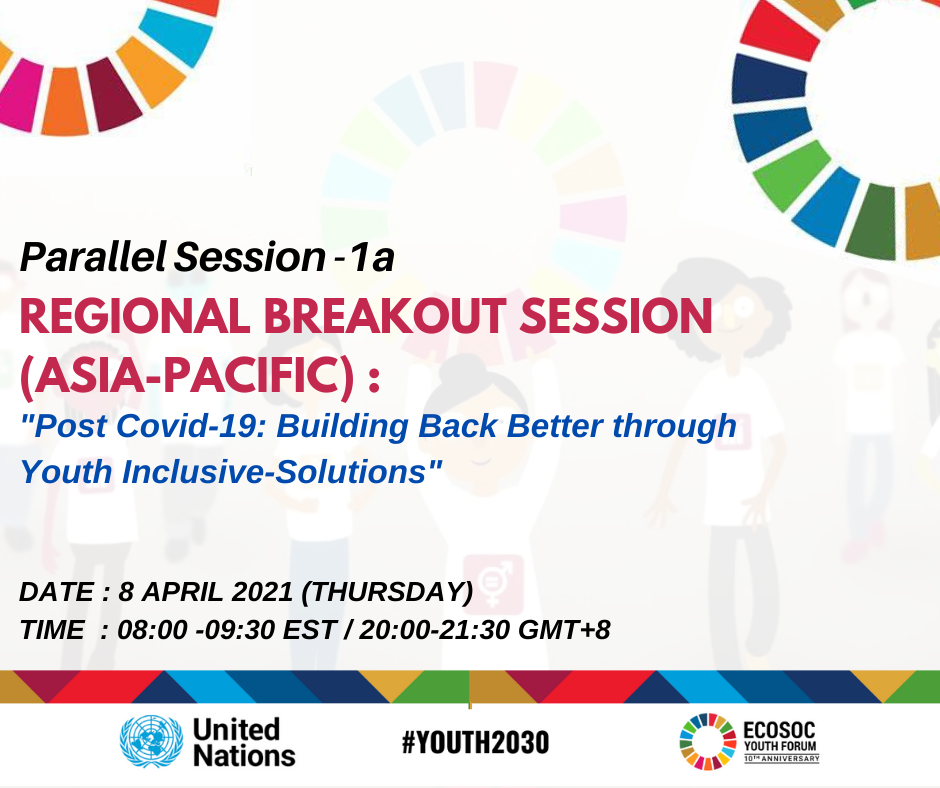9 April 2021, New York. – The 10th ECOSOC Youth Forum’s Asia-Pacific Regional Session (‘Asia-Pacific Region. Post Covid-19: Building Back Better Through Youth-Inclusive Solutions’) took place on April 8th online. The event was co-led by Asia Pacific Interagency Network on Youth (APINY) and Asia-Pacific Youth Caucus, Major Group for Children and Youth (MGCY) and co-organised by IYC4Peace initiative, International Youth Centre Foundation (Kuala Lumpur), Asian Youth Peace Network, as well as various UN and development partners, including UNDP, UNV, UNESCO, ILO, UN Habitat, and ADB.
Asia-Pacific Regional Session aimed at exploring the role of youth in responding to COVID-19 and building back more inclusive societies in the post COVID-19 period, in particular how youth participation and leadership has contributed to promote youth SDG advocacy.
During the first session, young people across the region and beyond discussed stories of success and limitations of youth action in terms of fostering solidarity during the pandemics. Young participants – a policy advisor from Japan, a humanitarian from Malaysia and a disaster risk reduction advocate from Indonesia among them – highlighted a uniqueness of the role that youth play in their society, including participation in digital transformation, building resilience of their communities and withstanding the spread of COVID-19 pandemic. It was agreed that youth is a huge driver behind the solidarity movement locally and globally. In order to tap this potential, youth’ vision has to be taken into account from the very start.
‘As young people we can choose to always complain… – says Muhammad Amir Arif, a young humanitarian from Malaysia, – Or we can be the people that are the solution to our society. ‘
The second section’s discussion revolved around tools and support mechanisms to promote youth participation and SDG advocacy. The participants expressed their wish to be meaningfully engaged in the decision-making process and be perceived as an important stakeholder.
‘Unfortunately, many youth events are usually side events at different international conferences, – shares Sofya Ignatenko, SDG advocate from Russia, – and not many stakeholders or policymakers come to listen to the voice of young people, hence – greater involvement of policymakers is also required for a broader engagement of youth. No one should forget that those young people of today will determine the future of tomorrow. ‘
A young climate activist from Fiji Ernest Gibson shared an interesting perspective on the barriers that complicate meaningful engagement of youth particularly in combating climate change: ‘It’s very easy for us to see the climate crisis, other environmental concerns and global inequality as three separate monsters. This is not only incorrect but also creates reality that is preventing us from being able to make substantive headway in the Sustainable Development Agenda… We are at a crucial point in human history where we have a choice to make, where we have a decision to choose between fundamentally changing the system that we are currently in, or changing nothing and potentially losing everything within the next 45 years’.
In 2021, UN-Habitat co-chairs Asia-Pacific Interagency Network on Youth (APINY). To know more about youth engagement in Asia-Pacific region, please visit Asia Pacific Interagency Network on Youth (APINY) website.



